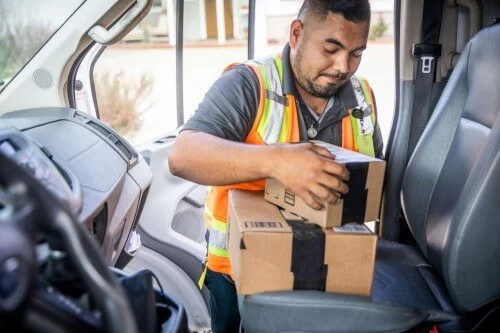UPS Address Validator: All You Need to Know
Ups Address Validator is a must-know in the shipping business because, in today’s globalized world, accurate address validation plays a crucial role in various aspects of business operations, especially in the realm of shipping and logistics. One tool that has gained significant popularity in this regard is the UPS Address Validator. We will show you what you need to know about it as you read through it.

What is UPS Address Validator?
UPS Address Validator is a powerful software tool designed to ensure the accuracy and validity of addresses.
It serves as a reliable solution for businesses that rely on shipping and logistics operations. This tool utilizes advanced algorithms and integrates with UPS’s extensive database to verify the correctness of addresses entered by customers.
The primary purpose of the UPS Address Validator is to prevent shipping errors and improve the overall efficiency of the shipping process.
By validating addresses before packages are shipped, businesses can reduce the occurrence of misdeliveries, returned packages, and other shipping-related issues.
READ ALSO!!!
- How to Send a Package UPS | A Guide to Effectively Use UPS
- UPS for Small Business | Understanding How UPS Store Works
- Understanding UPS Shipping Zone | An Easy Guide
- What is Ups Mychoice and How Does it Work?
Key Features of UPS Address Validator
Here are the key features of the UPS Address Validator:
1. Real-Time Validation
The Ups Address Validator offers real-time validation, allowing you to verify addresses instantly as they are entered into your system.
This feature eliminates the need for manual data verification and significantly reduces the chances of errors.
2. Address Autocomplete
By utilizing address autocomplete functionality, the Ups Address Validator suggests accurate address options as users type.
This feature enhances user experience, reduces keystrokes, and minimizes data entry errors.
3. International Address Verification
Whether you operate locally or globally, the Ups Address Validator has comprehensive coverage of international addresses.
It can validate addresses from various countries, ensuring that your shipments reach the intended recipients no matter where they are located.
4. Data Cleansing
The Ups Address Validator not only verifies addresses but also cleanses and standardizes address data.
It corrects formatting inconsistencies, eliminates duplicate entries, and ensures your address database is clean and accurate.
5. Integration Options
This powerful tool seamlessly integrates with various platforms and applications, including e-commerce websites, customer relationship management (CRM) systems, and order management systems.
Integration is simple and efficient, allowing you to incorporate address validation seamlessly into your existing workflows.
Why is Address Validation Important?

Address validation is paramount in various aspects of business operations, particularly in the realm of shipping and logistics. Here are several reasons why address validation holds such significance:
1. Accurate Deliveries
Address validation ensures that packages and shipments reach their intended destinations accurately.
By verifying the correctness of addresses, businesses can minimize the risk of misdeliveries, which can be costly and time-consuming to rectify.
2. Reduced Costs
Inaccurate addresses can lead to additional expenses. Failed deliveries, return shipments, and rerouting all incur extra costs for businesses.
Address validation helps mitigate these expenses by preventing such issues and streamlining the shipping process.
3. Customer Satisfaction
Delivering orders promptly and accurately is crucial for customer satisfaction. Address validation plays a key role in ensuring that customers receive their packages without any delays or complications.
By providing a seamless and error-free shipping experience, businesses can enhance customer satisfaction and loyalty.
4. Efficient Operations
Address validation contributes to the overall efficiency of shipping operations. By eliminating errors and inaccuracies in addresses, businesses can avoid unnecessary delays and disruptions in the supply chain.
This, in turn, leads to improved operational efficiency and smoother logistics processes.
5. Brand Reputation
Delivering packages to the wrong address or experiencing frequent shipping errors can tarnish a business’s reputation.
Address validation helps safeguard brand reputation by reducing the occurrence of delivery mishaps.
Providing a reliable and consistent shipping experience enhances customer trust and confidence in the brand.
6. Data Accuracy
Address validation ensures that accurate and standardized address data is collected and stored.
This data can be valuable for future marketing campaigns, customer analysis, and demographic insights.
Having clean and reliable address data enhances the effectiveness of these initiatives.
7. Compliance with Regulations
Regulatory compliance is vital in certain industries, such as finance and e-commerce.
Address validation helps businesses meet compliance requirements by ensuring that accurate customer addresses are collected and utilized by relevant regulations.
Benefits of Using UPS Address Validator
These are the benefits of using UPS Address Validator:
1. Improved Delivery Accuracy
By ensuring that your address data is accurate and validated, the Ups Address Validator helps you achieve higher delivery accuracy rates.
This translates to satisfied customers, reduced returns, and enhanced brand reputation.
2. Time and Cost Savings
Manual address verification can be time-consuming and prone to errors. The Ups Address Validator automates the process, saving you valuable time and minimizing the need for manual intervention.
Additionally, accurate addresses reduce shipping costs associated with undeliverable or returned packages.
3. Enhanced Customer Experience
With the Ups Address Validator’s real-time validation and address autocomplete features, your customers will enjoy a seamless checkout experience.
Fewer address-related errors mean smoother transactions and increased customer satisfaction.
4. Data Integrity and Compliance
Address data integrity is crucial for businesses, particularly in industries such as finance, healthcare, and logistics.
The Ups Address Validator ensures your address data is clean, standardized, and compliant with industry standards and regulations.
5. Scalability and Flexibility
The Ups Address Validator is designed to scale your business. Whether you’re a startup or an enterprise-level organization, this tool can accommodate your address validation needs, providing flexibility as your business grows.
How to Implement UPS Address Validator
Implementing UPS Address Validator is a straightforward process that involves the following steps:
1. Evaluate Integration Options
Start by assessing the integration options available for UPS Address Validator.
Determine whether your existing shipping software or e-commerce platform supports integration with UPS Address Validator.
Check for compatibility and any specific requirements outlined by UPS.
2. Register for UPS Address Validation API
To access UPS Address Validator, you need to register for the UPS Address Validation API. Visit the UPS Developer Kit website and create an account.
Follow the registration process and obtain the necessary API credentials and access keys.
3. API Integration
Once you have obtained the API credentials, you can proceed with integrating UPS Address Validator into your system.
This integration can typically be done through programming or scripting languages such as JavaScript or PHP.
Follow the API documentation provided by UPS to understand the integration methods and code snippets required.
4. Configure UPS Address Validator
After successful integration, configure the UPS Address Validator settings according to your specific requirements.
This may include specifying the validation level, addressing standardization preferences, and any additional customization options available.
5. Test and Debug
Before deploying UPS Address Validator in a production environment, thoroughly test the integration to ensure its functionality and accuracy.
Test various scenarios, including valid and invalid addresses, to verify that the validation process works as expected. Debug any issues that arise during testing to ensure smooth operation.
6. Monitor and Maintain
Once UPS Address Validator is implemented, regularly monitor its performance and address validation results.
Stay updated on any API changes or updates from UPS and make necessary adjustments to your integration if required. It’s also essential to keep the software and systems involved in the integration up to date to ensure compatibility and security.
7. Train and Educate Users
Provide training and resources to your team members or users who will be utilizing UPS Address Validator.
Familiarize them with the tool’s features, how to access and utilize it within your system, and any specific guidelines or best practices for address validation.
By following these implementation steps, you can successfully integrate UPS Address Validator into your business operations, enabling accurate address validation and improving the efficiency of your shipping processes.
Address Validation and Data Security

Address validation is not only crucial for accurate deliveries and streamlined shipping processes but also plays a significant role in ensuring data security.
Here’s how address validation and data security intersect:
1. Protection of Customer Information
Address validation often involves collecting and processing customer data, including addresses and personal details.
It is essential to prioritize the security of this sensitive information. Implement robust data security measures, such as encryption, access controls, and secure storage, to safeguard customer data from unauthorized access, breaches, or misuse.
2. Compliance with Data Protection Regulations
Address validation processes must adhere to applicable data protection regulations, such as the General Data Protection Regulation (GDPR) in the European Union or the California Consumer Privacy Act (CCPA) in the United States.
Ensure that your address validation practices align with the necessary legal requirements, including obtaining appropriate user consent and providing transparency about data handling practices.
3. Secure Data Transmission
When integrating address validation into your systems or utilizing third-party address validation services, ensure that data transmission is secure.
Use encrypted connections (e.g., HTTPS) when transmitting address data between systems to prevent interception or tampering.
4. Data Minimization
Practice data minimization principles when handling address validation. Only collect the necessary data required for address verification, and avoid retaining data for longer than necessary.
Minimizing the data footprint reduces the potential risk in case of a security breach.
5. Vendor Due Diligence
If you rely on third-party address validation services, conduct thorough due diligence to ensure that the vendors follow robust security practices.
Assess their security protocols, data handling procedures, and compliance with relevant certifications or standards.
6. Secure API Integration
If you integrate address validation via APIs, implement secure authentication mechanisms, such as API keys or tokens, to control access and prevent unauthorized usage.
Apply proper authorization and access controls to restrict access to the address validation service.
7. Audit and Monitoring
Regularly audit and monitor your address validation systems and processes to identify any vulnerabilities or potential security risks.
Implement logging and monitoring mechanisms to detect and respond to any suspicious activities or unauthorized access attempts promptly.
8. Employee Training
Educate your employees about data security best practices and the importance of handling customer data securely.
Train them on identifying and reporting potential security threats or breaches related to address validation processes.
Address validation should not compromise data security. By implementing robust security measures, complying with data protection regulations, and prioritizing the protection of customer information, businesses can ensure both accurate address validation and the integrity of sensitive data.
Remember, data security is an ongoing process. Regularly reassess your security measures, stay informed about emerging threats, and adapt your practices to maintain a secure environment for address validation and customer data protection.
Future Trends in Address Validation
Address validation is an evolving field, and several future trends are expected to shape its landscape. Here are some anticipated trends in address validation:
1. Advanced Machine Learning and AI
The integration of machine learning and artificial intelligence (AI) technologies is expected to enhance address validation processes.
These technologies can improve accuracy by analyzing vast data and learning from patterns and trends. AI algorithms can adapt to address variations and provide more precise validation results.
2. Improved International Address Validation
As e-commerce continues to grow globally, the demand for accurate international address validation will increase.
Future trends will focus on enhancing international address validation capabilities, accounting for diverse address formats, cultural nuances, and regional postal systems.
Integration with international address databases and collaboration with local postal authorities will provide more reliable international address validation.
3. Geolocation and Geocoding Integration
Geolocation technology, coupled with geocoding services, will play a significant role in address validation.
Integrating geolocation data with address validation processes can provide real-time location-based verification, enabling businesses to confirm addresses and streamline logistics.
Geocoding, which associates coordinates with addresses, can enhance precision and enable more accurate delivery routing.
4. Integration with IoT Devices
The rise of the Internet of Things (IoT) presents opportunities for address validation. Connected devices, such as smart home assistants or delivery drones, can leverage address validation services to ensure accurate and seamless interactions with customers.
Integration of address validation into IoT ecosystems will enhance the efficiency and reliability of address-related functions.
5. Blockchain for Address Verification
Blockchain technology offers a decentralized and tamper-resistant framework that can enhance address verification. By storing address validation records on a blockchain, businesses can create an immutable and transparent system for verifying addresses.
This can enhance trust, security, and reliability in address validation processes.
6. Seamless Integration with CRM and ERP Systems
Address validation systems will increasingly integrate seamlessly with customer relationship management (CRM) and enterprise resource planning (ERP) systems.
This integration will enable businesses to validate addresses at various touchpoints, ensuring consistency in address data across their operations and improving overall data quality.
7. Data Collaboration and Crowdsourcing
Collaboration among businesses, government agencies, and individuals can contribute to more accurate address validation.
Sharing anonymized address validation data can enhance the accuracy of address databases and improve the performance of validation algorithms.
Crowdsourcing address validation efforts can tap into collective knowledge and experiences to refine and validate addresses effectively.
These future trends in address validation demonstrate the industry’s commitment to continuous improvement and innovation.
By leveraging advanced technologies, embracing international validation, integrating with emerging systems, and focusing on data collaboration, businesses can expect more accurate, efficient, and reliable address validation processes in the years to come.
READ ALSO!!!
- UPS Worldwide Saver: What is It?
- UPS Ship Food: Can You Ship Frozen Food With Ups?
- How to Ship a Bike UPS: A Guide to Shipping Bike
- What is UPS Surepost and How Does It Work?
Frequently Asked Questions
1. How Does the UPS Address Validator Work?
The Ups Address Validator uses advanced algorithms and a comprehensive database to verify, standardize, and cleanse address data.
It compares entered addresses against its vast repository of validated addresses, ensuring accuracy and reliability.
2. Can the UPS Address Validator Validate International Addresses?
Yes, the Ups Address Validator has extensive coverage of international addresses. It can validate addresses from various countries, making it a versatile solution for businesses operating globally.
3. Does the UPS Address Validator Integrate with E-Commerce Platforms?
Absolutely! The Ups Address Validator seamlessly integrates with popular e-commerce platforms, such as Shopify, WooCommerce, and Magento, ensuring that address validation becomes an integral part of your online store’s workflow.
4. Is the UPS Address Validator Suitable for Small Businesses?
Yes, the Ups Address Validator caters to businesses of all sizes. Its scalability and flexibility make it an ideal choice for startups and small businesses looking to optimize their address verification processes.
5. Can the UPS Address Validator be Customized to Meet Specific Business Needs?
Certainly! The Ups Address Validator offers customization options to align with your unique requirements. Whether you need specific validation rules, custom integrations, or additional features, the tool can be tailored to suit your business needs.
6. What is the Pricing Model for the UPS Address Validator?
For detailed pricing information, it is best to contact Ups directly. They offer different pricing plans based on factors such as usage volume, integration requirements, and support options.
Conclusion
Accurate address verification is paramount for businesses across industries. The Ups Address Validator provides a comprehensive solution to streamline and optimize the address verification process.
With its advanced features, real-time validation, and international coverage, this tool ensures accuracy, efficiency, and improved customer experience.
By leveraging the Ups Address Validator, you can enhance your delivery accuracy, save time and costs, and maintain data integrity.
Embrace this game-changing tool and revolutionize your address verification process today.
